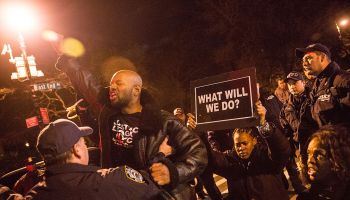Citing the death of Kalief Browder, who committed suicide following two years in solitary confinement at New York’s Rikers Island without a conviction, President Barack Obama announced a ban on the practice for juveniles in the federal prison system.
In an op-ed appearing Tuesday in The Washington Post, the president highlights executive actions that prohibit federal corrections officials from putting prisoners in solitary confinement for so-called “low-level infractions.” The steps also call for expanding treatment for mentally ill prisoners. The changes could affect up to 10,000 inmates, according to the Post.
Browder, 22, a native of the Bronx, last year became a poster child for prison reform after he hanged himself in June with an air-conditioning cord. Relatives, who filed a $20 million lawsuit against the city, said he suffered flashbacks from his experiences at Rikers.
From The Post:
In 2010, a 16-year-old named Kalief Browder from the Bronx was accused of stealing a backpack. He was sent to Rikers Island to await trial, where he reportedly endured unspeakable violence at the hands of inmates and guards — and spent nearly two years in solitary confinement.
In 2013, Kalief was released, having never stood trial. He completed a successful semester at Bronx Community College. But life was a constant struggle to recover from the trauma of being locked up alone for 23 hours a day. One Saturday, he committed suicide at home. He was just 22 years old.
The Post notes that Obama’s call for “reforms come six months after Obama, as part of a broader criminal-justice reform push, ordered the Justice Department to study how solitary confinement was being used by the federal Bureau of Prisons.”
Reports The Post:
The move is another example of the extent to which the nation’s first African-American president now seems willing to tackle delicate questions of race and criminal justice as he closes out his presidency. Obama has also been focused on trying to put in place programs to help ex-offenders reintegrate into society once they have left prison.
“How can we subject prisoners to unnecessary solitary confinement, knowing its effects, and then expect them to return to our communities as whole people?” the president wrote in his op-ed. “It doesn’t make us safer. It’s an affront to our common humanity.”
The president said he hopes the federal reforms will serve as a model for states to overhaul their rules for solitary confinement.
SOURCE: The Washington Post, The Washington Post | PHOTO CREDIT: Getty | VIDEO CREDIT: Inform
SEE ALSO:
Obama’s Prison Visits Sheds Light On A Reason So Many Black People Can’t Vote
President Obama Reflects On His Own Mistakes During Historic Visit To Federal Prison
President Obama Gives 22 Federal Prisoners A Second Chance Through Clemency
















